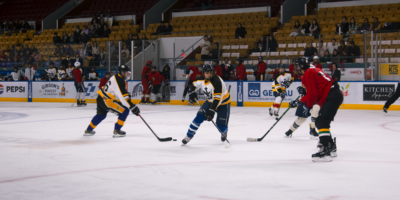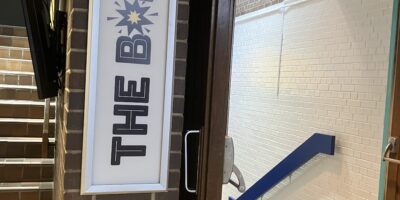It’s here. The last issue of the term. This is not an overwhelmingly happy issue. As you would have seen on the front cover of this issue—and on nearly every media or social media outlet in the world—the wonderful theoretical physicist Stephen Hawking has left us, much to the dismay of the millions he has inspired though his work and by overcoming immense physical barriers. I would also like to ask you to join me in remembering Daniel Hui, brother of ex-Editor-in-Chief Nancy Hui. His obituary is on the facing page. My deepest condolences, Nancy, to you and your family.
While this is not an issue of overwhelming happiness, nor is it one of complete sadness. Firstly, I am excited to name my replacement as Rafiq Habib! You will have undoubtedly enjoyed his work over the past 8 months, but Rafiq brings quite a bit more experience than that to the paper, having been an editor of his high school newspaper as well. I look forward to seeing all of his new ideas! In the meantime, I’m excited to see Hasan step up to the plate as he takes up the roll of EIC next term.
A tremendous thank you to Raeesa this week, who tackled the issue that seems to be gripping the entire world these days: Cambridge Analytica and what social media means for democracy around the world (page 13). Another big shout-out to Kai, who covered the story of a nerve agent being used on a Russian double-agent in Britain (page 6). Finally, a big thank you to my family; I didn’t think I’d get another chance to do this after my last Issue 5, but now I can: You’ve supported me though 5 long years. Whenever I’ve needed someone to talk to, you’ve been there. When school got tough, you took over the parts of my life that I was neglecting—like finding coop housing. When coop got tough, you reminded me how I felt overwhelmed the first week of every term. When I had relationship troubles, you gave me the hug and crying-shoulder that I needed. I would not have made it far without you.
School seems so short. Everywhere I look, I see signs of how recently I came here. I still remember the first time I came to Waterloo, when my parents took me to check out the campus in grade 11. We had lunch at McDonald’s. For months and months I wondered where that restaurant was, or the long, forested road I remembered driving on to get from my home in London to the Waterloo campus. It was almost a year after I moved out of residence before I discovered the McDonald’s I sought was at King and Columbia, a three-minute walk from my new house on Hickory Street. It was another six months and a bold (failed) expedition to a Tim Hortons on the west side of campus before I learned the magical forest I couldn’t find was the lightly-wooded stretch of University between Erb and Fisher-Hallman. I remember living at Waterloo Central Place, a residence that no one has heard about because it’s a residence Waterloo rented from Laurier for a term. It was supposed to be torn down immediately after we left in Spring 2014, but instead the buildings sit there, quiet and empty, the roof still—presumably—slowly collapsing. Some nights, when I’m bored, I try to look through the back window of my old apartment to spot the fan that my roommate forgot on the kitchen counter.
My relationship with Waterloo has been a little bit tumultuous over the last five years. It’s been the source of my highest highs and my lowest lows. Not a lot of people know how much I’ve changed since first year, since the biggest change has been getting out, making friends, and becoming involved; there aren’t too many people around to remember the shy, quiet, constantly-studying Cameron because that Cameron didn’t have all that many friends. I attribute a lot of the change to The Iron Warrior, which I have been an active member of since I started at Waterloo. The Editor-in-Chiefs (EICs) I worked with were so kind, friendly, and encouraging. It was nice to have at least a small space where I could come out of my shell. The only other big thing I remember from first year is that, by some spontaneous arbitrary decision, I started a habit of rewriting my notes every week on Friday evening.
The biggest change came in 2B, during my first tenure as EIC. All of the sudden, I had to run meetings, talk to advertisers, forcibly extract articles from people, and—most importantly—go to EngSoc meetings to give updates on the paper to council. Little did I know that that first venture would bloom into a long chain of directorships and involvement with EngSoc, ending with me becoming Student Services Commissioner in 4B.
Third Year can be described as the downturn. Coming off the peak of 2B, when my confidence was at a peak and I was the most happy person alive, made the crash all the worse. I can pinpoint the exact week, in fact. It was the week after reading week, February 2016. After a quiet, relaxed start to the term, I was enjoying a successful exam season and ski trip to Mont Tremblant. My joviality was abruptly disrupted when a classmate did some quick finger counting and realized that we had an average of one academic deliverable per three days for the rest of the term, most of them large and substantial projects or reports. Within a week, I had gone from a high-achieving, dedicated student to losing all motivation. I started handing in half-finished assignments and last-minute reports. I learned a lot about myself that term, like that I get passive-aggressive when I’m tired and that my marks wouldn’t drop quite as much as I expected if I relaxed a little bit.
Now it’s all coming to an end. As I sit here, the most confident I’ve ever been, surrounded by more friends than I can count, a great weight lifted off all of our collective shoulders because the nightmare that is FYDP symposium is over, most of what I think about is how unexpected my university journey has been. I never predicted I would be EIC once, much less twice. I never expected I would get heavily involved in volunteering and student government. I certainly never thought that I would be the one at a party looking for wallflowers to coax out of their comfort zone, or starting conversations with strangers at a gathering.
The thing I think about most is how lucky I’ve been. I was lucky to hear about Waterloo somehow. I was lucky to get into this school, where co-ops are mandatory and expectations are high. I was lucky to hear about The Iron Warrior and decide that that was the kind of club I wanted to get involved in. I was lucky to be forced to go to an EngSoc meeting. I was lucky to have friends and family there to support me or even just suffer alongside me through the difficulties of third year. In short, I was so lucky that I’ve become the person I am today, someone I am immensely proud of.
I’ve wondered for a long time how I can keep that luck going. I’ve already had a full, wonderful life in the last five years, but I don’t want it to stop. “Can I create more luck?” I’ve wondered. What did I do to facilitate my time here? Was it luck or my own choices?
Many years ago now, the economics podcast Freakonomics started an experiment where they asked people facing difficult decisions, like whether to end a long-term relationship or quit a job, to flip a coin to make the decision for them. In follow-up surveys performed up to six months after the coin flip was performed, people who took the active path—changing the job or leaving the relationship—were statistically happier than those who took the passive path. This is true both in all respondents and in the respondents who took the coin’s advice. This is as close as I can find to an objective measure of how our choices affect us.
Maybe this result means that people like change. Maybe it’s that our brains are highly attuned to what will make us happy, and when we start thinking about changing something it’s for a good and compelling reason. Maybe it’s just a random, insignificant finding I am encouraging my readers to put too much weight in. But I’m willing to take a chance and say yes to new opportunities even if they scare me. Some of them won’t work out, but that’s OK; I’ve made it through difficult times before, so I know I can go through them again.
There’s that cliché that the thing you get from university (or any other event in your life) is the experiences, not the knowledge. I can actually quantify that. Those notes I mentioned writing every Friday night at the top of the article? That wasn’t just idle reminiscing. I’ve kept up that tradition to this day and I still have every one of those notes since 1B. They occupy about 30x30x30 cm, most of that air or the binders I keep them in. I’ve also scanned all my notes to pdfs, where they take up about 100 MB. That could fit on a USB from 2003. How many photos would I need to capture all my memories? How do you encode the feeling of being a zombie from lack of sleep? How do you store the high from making it through a difficult presentation? How do you transmit the excitement of orientation week or the fear of being hunted down during Humans vs. Zombies? Maybe you can, maybe you can’t. But you sure can’t do it in the couple hundred pieces of paper where I have written most of my academic achievement.
To bring this wandering conversation to a close, thank you reader. I’d thank individuals who I think made a huge difference in my life, but I’m worried I’d forget someone important. In any case, I wouldn’t have enough room on this page even if I did nothing else. I like to think that I’ve interacted with a large portion of the engineering student body in my time here, and the vast majority of you have made my time better. It has warmed my heart every time I saw someone get a paper from the rack. It’s pleased me so much to see people trying to do my crosswords, even if they are bitching about the numerous spelling mistakes and impossible clues I’ve included.
The best and worst day of my life have both occurred within the bounds of Ring Road. Thank you for sharing them with me.




Leave a Reply